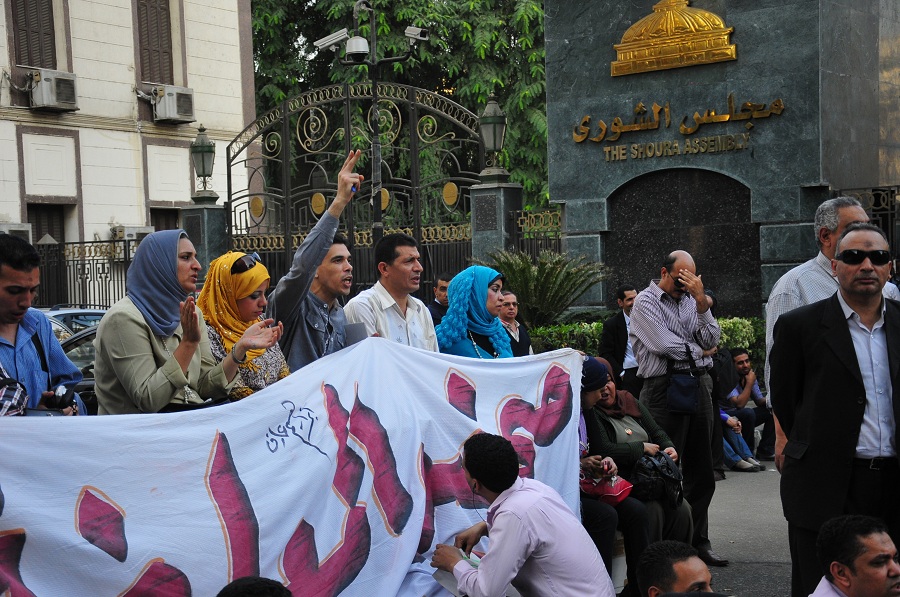CAIRO: Omar Suleiman, the director of Egypt’s general intelligence service and a possible successor to Egyptian President Hosni Mubarak, has been named the most powerful intelligence chief in the Middle East by Foreign Policy Magazine. It is widely believed the president is grooming his son, Gamal Mubarak, to succeed him, but Suleiman is very popular and may have the backing of factions within the military.
Some Egyptian analysts see his popularity as a staged buffer to help Gamal succeed his father in a smooth transition, while others see him as one of various powerful contenders for the presidency.
Dalia Ziada, an Egyptian liberal activist and blogger, said that were Suleiman to run in the next presidential election she did not believe he would have a good chance of winning.
“Maybe the ruling National Democratic Party will support him, she told The Media Line, “but at the end of the day, he’s a national security man, he’s not a politician. He’s not good in dealing with internal and external politics.
Ziada predicted the Egyptian government would use Suleiman as a mediator, putting him in power straight after Mubarak so that it will not look as though Mubarak were passing on the throne to his son. Suleiman’s apparent popularity was highlighted in a recent survey Ziada carried out independently on her blog, in which she asked participants to rank their choice for the next president.
In the first phase of the survey, she provided the participants with six candidates, and asked that they propose other candidates if they were not satisfied with the selection.
Many wrote back asking her to add Suleiman into the mix, she said.
In the second phase of the survey, however, Suleiman only garnered 4 percent of the 3,000 votes received.
Ziada argued that Suleiman’s popularity was to a large degree confined and would not lead him to presidency.
“He’s popular, because he’s leading a very critical authority in Egypt, which is the Mukhabarat [intelligence service], Ziada said. “Anyone in his position must be respected by Egyptians, but it does not mean they’ll select him when it comes to their future.
Suleiman, 74, became director of the country’s intelligence service in 1993 after an extensive military career, and is said to be one of a very small circle of people in whom Mubarak trusts.
Suleiman has helped Mubarak clamp down on Islamist opponents and the intelligence chief’s combating of Islamist terrorists increased his standing in the eyes of Western intelligence services after 9/11.
More recently, Suleiman has been serving as a high-ranking diplomat and has been the main mediator in the indirect talks between Israel and the Palestinian Hamas.
He is also Cairo’s main interlocutor for several Palestinian groups engaged in reconciliation talks.
Mubarak has been president for the past 28 years and there is wide speculation that the 81-year-old leader will not be seeking another term in office. Some believe the president may even step down before the end of his current tenure, set to come to an end with presidential elections slated for 2011.
Analysts say that even if Suleiman does not succeed Mubarak, he is still likely to maintain a powerful role in the regional scene.
Hala Mustafa, editor in chief of the Democracy Review, a political quarterly published by the Al-Ahram Institute, said it was very difficult to measure anyone’s popularity in Egypt outside of the ballot box. “But I can say [Suleiman] is respected among the elite and among the ruling party and ruling elite in general, she told The Media Line.
Rather than have Suleiman and Gamal Mubarak run against each other, she said it was more likely that Gamal would be groomed for the presidency and Suleiman for the vice presidency.
If Suleiman wishes to run for president he would have to resign from his position as intelligence chief and run either as an independent or as a candidate of the ruling party, Mustafa said.
The Foreign Policy Magazine report, authored by US Department of Defense employee Patrick Devenny, places Suleiman at the head of a list of five other “spooks who include Israel’s Mossad Chief Meir Dagan, head of the Iranian Quds Force Qassem Suleimani, the Syrian military’s deputy chief of staff Assef Shawkat and Saudi Prince Muqrin Bin Abd Al-Aziz, the director general of the Kingdom’s General Intelligence Presidency.

